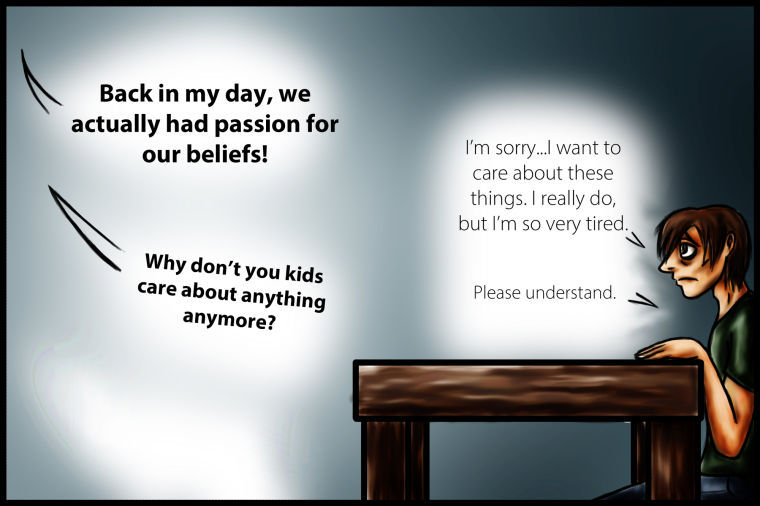Not apathetic, just tired
February 24, 2014
The current generation of college-aged students has earned a reputation based on apathy, but apathy might just be mistaken for 21st-century pragmatism.
It’s true that our generation is not overwhelmingly characterized by vocal activism and loud outrage. However, a lack of vehement indignation should not be mistaken for an absence of feeling.
A recent study suggests that empathy levels have seen a significant decline during the past 30 years, according to Scientific American. The average student is supposedly 75 percent less empathetic than students three decades ago.
An increase in narcissism has shadowed the drop in empathy, and scientists do not know what the responsible factors are. Increases in isolationism and the deterioration of reading for pleasure have been thrown out as possible influences.
Assessing empathy can be done in a variety of ways. The study asked people to measure their own empathy through the Interpersonal Reactivity Index, a well-known questionnaire that asks how the responder agrees with a number of statements.
Empathy is a dynamic characteristic that can be molded by just about anything, which makes it hard to believe that a simple questionnaire has the potential to accurately measure the emotion.
Scientists are focusing their narrow search for the alleged loss of empathy to scientific reasons when they really should be looking for a social cause. Specifically, they should be looking at the death of the avid listener.
Younger individuals have a wide array of sentiments and especially about their education. However, society often fails to pay attention. Students feel strongly about many topics, but from kindergarten to college our opinions are belittled and ignored.
It should not be surprising that we aren’t marching in the streets when educators and the majority of civilization have proven time after time that we can shout all we want without hope of someone listening.
For example, students claim that tuition is too high and as a result are force to devote time to their work in lieu of their studies, and that claim is followed by a double-digit percentage increase in tuition and student loans with high interest rates.
The current college generation is overextended, not disengaged, an aspect that many professors and administrators fail to understand.
Recently, WSU undergraduates have gotten a lot of flak for not attending the recent men’s basketball game against the California Bears.
Shocker, shocker. Most basketball games are at night, the time at which most students are just getting to work after a full day of classes to pay for outrageously high tuition and living costs. One night of work for the average student is the difference between eating somewhat healthy or living off of instant oatmeal for the week.
Working full or part time jobs has even been cited as one of the primary causes of student “apathy,” according to the International Journal of Educational Research and Development.
Most colleges recommend their students work no more than 10 to 15 hours per week. Regardless one in five undergraduates work more than 35 hours in a week with half of all college students clocking in at minimum 20 hours per week, according to CBS News.
World class leadership is a nice catchphrase, but all it really means is that sleep is for the faint of heart.
Disinterest in and outside of the classroom isn’t apathy, it’s exhaustion. Pragmatically, students have learned to direct their attention to where it most counts, usually focusing on work and the classes imperative to their field of study.
The alleged epidemic of apathetic college students would not be drawing attention far and wide if educators simply stopped to listen. There is a gap between what higher education provides and what students need, but just like the tree in the forest, there’s no one to hear the students falling.
– Corrine Harris is a senior animal science major from Edmonds. She can be contacted at 335-2290 or by [email protected]. The opinions expressed in this column are not necessarily those of the staff of The Daily Evergreen or those of Student Publications.



















